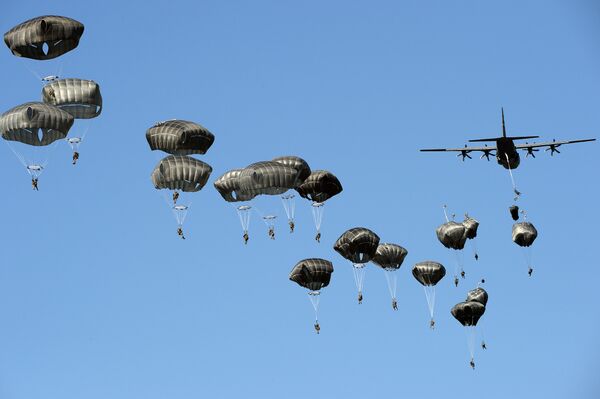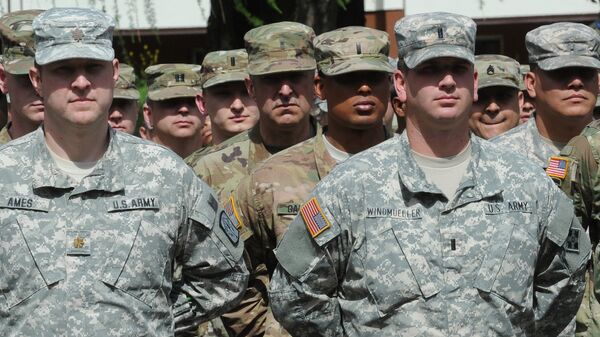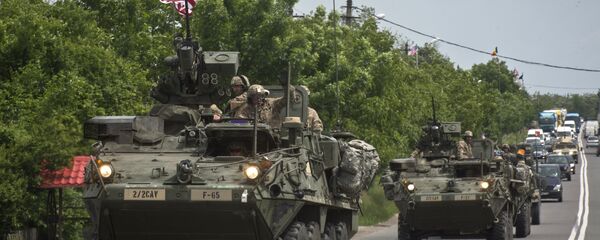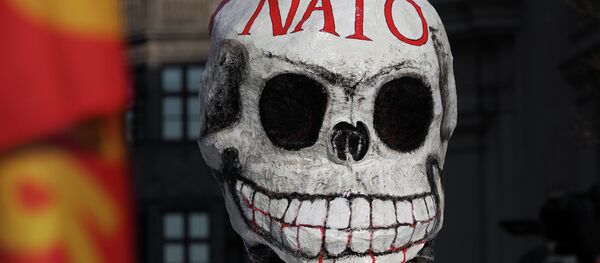NATO has begun its largest war game since the end of the Cold War-era in Poland, involving 31,000 troops from 24 countries. The United States has provided 14,000 soldiers for Anaconda-2016 this year.
The move is aimed at demonstrating NATO's military might and readiness to Moscow.
However, there is hardly any sense in it. Does anyone really believe that Russia pose a threat to the US or Europe?
"It looks like NATO is aiming for yet another Guinness World Record besides 'longest occupation of Afghanistan in modern history'; it already enjoys all the honors and privileges that come with this distinction. [This time,]NATO will make history in a different, almost equally useless way," American journalist Riley Waggaman writes for the Huffington Post, commenting on the NATO war game on Russia's doorstep.
Watch #Soldiers maneuver the M1A2 SEP v2 Abrams main battle #tank at #Anakonda2016 https://t.co/9OuxGlszCu pic.twitter.com/jaJL6txod7
— DVIDS_Rachel (@DVIDS_Rachel) 10 июня 2016 г.
Mocking NATO's "Russia-threat" narrative, the journalist asks: "Why did Russia put its country so close to our [NATO] military bases and peaceful international war games, anyway?"
If that is not enough, he reasons, it may be worth uncovering what country has deployed the largest number of foreign military bases and conducted the largest number of military interventions in the last 25 years.
Michael Curtis of the American Thinker echoes Waggaman:
"Is the Russian buildup a danger to the security of the NATO countries and to [the] US? The US pays a disproportionate amount for NATO arrangements in money and manpower. The US spends $600 billion on defense while Russia spends $84 billion; the US has 19 aircraft carriers to Russia's one," Curtis notes.
Here's US military spending vs. the entire rest of the world https://t.co/osdq9o3XXW pic.twitter.com/q823X3Frul
— W.J. Hennigan (@wjhenn) 6 апреля 2016 г.
Indeed, according to the Peter G. Peterson Foundation, US spends more on defense than China, Saudi Arabia, Russia, the UK, India, France and Japan combined.
On the other hand, a "bogeyman" is absolutely necessary to justify the existence on the NATO bloc. Indeed, NATO's raison d'etre had vanished with the collapse of the USSR and disintegration of the Warsaw Pact.
"Without cynicism, it can be argued that NATO needs a bogeyman version of Russia as a major threat [in order] to survive as an organization," Curtis underscores.

Surprisingly, the real menace to Western civilization, international terrorism, seems beyond the scope of US war planners and NATO officials.
NATO does not really address it because it lacks the ability to do so, for several reasons.
"Some commentators have questioned the value of NATO's role in intelligence-gathering on terrorism. NATO has no law enforcement role and cannot replace Europol as a counter terrorism center," Curtis explains.
"This is the role that NATO should be playing in cooperation with Russia. The present policy of NATO is based on the false premise that Russia is a threat. It should accept that the real threat is Islamist terrorism, and the two sides must cooperate on this," the journalist stresses.



